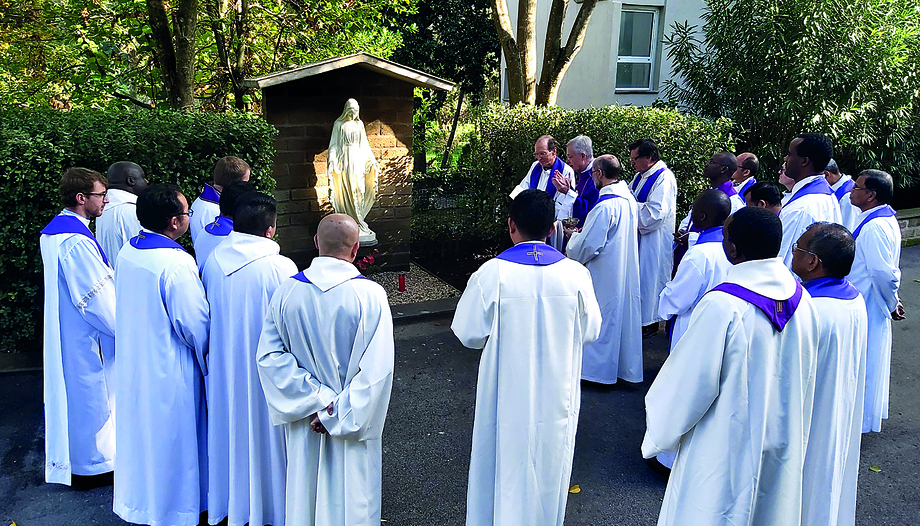For more than a decade I have been working in the general treasury of a Catholic congregation, where I am in charge of administering goods that are ultimately destined for the service of the poor. In order to understand this, it is necessary to base one's work on an economic system based on value, understood from a religious point of view.
Therefore, economy and finance are considered as a fraternal economy, that is, with a perspective oriented towards helping the poor. Only in this way is it possible to avoid falling into the temptation to mismanage goods. Because, as the Holy Father John XXIII said, we are not yet angels, that is, we can always make mistakes that divert us from the correct use of the goods and properties that are at our disposal.
The common good in the management of a congregation's patrimony
Cardinal Peter Turkson, when he was president of the Pontifical Commission for Justice and Peace, said in 2012 that obstacles to the service of the common good come in many forms, such as corruption, absence of the rule of law, greed tendencies, mismanagement of resources; but the most significant for a business leader on a personal level is leading a divided life.
These warnings are important in order to avoid a financial crisis situation with the ensuing panic caused by compromised investments, external debt, poor cash management and the breakdown of systems and accountability structures.
Conjugating the secular and the religious
The important aspect to understand is that there are two languages related to financial aspects, one language of the economic and secular world, and the other of the missionary and religious world.
Economics speaks through the language of the secular world, so it refers to the movement of money in different currencies, considers whether there is a profit or loss, whether there is income or expenditure, prepares and respects a budget, makes investments, monitors financial position and wealth.
The mission speaks purely in religious language, using the terms gratitude, simplicity, justice, sacrifice, sharing, ministry, vow of poverty.
At the center of the two languages are values; obviously, in order to function, the religious mission must use economic language, but only as a means; the value for the religious world is that of missionary language. For the secular world, on the other hand, economic language is both a means and a measure of value.
The values that enable the functioning of a religious congregation are based on the Gospel of Jesus Christ: Matthew 25:14-30, the parable of the talents on industriousness and work, on administration and management.
Pontifical Magisterium
The teachings of the Church are found in the encyclicals Rerum Novarumby Leo XIII (1891); Centesimus AnnusThe example of Pope Francis, in addition to the personal example of John Paul II, in 1991. The example of Pope Francis, in addition to his personal example, is expressed in Evangelii Gaudiumof 2013; in Laudato Si'2015, and in Fratelli Tuttiof 2020.
In the apostolic exhortation Evangelii Gaudium Pope Francis speaks of the social inclusion of the poor, that the heart of the Christian moral message is reciprocal love, which should motivate Christians to share the Gospel, help the poor and work for social justice; to avoid the evil of power that creates and feeds inequality and indifference, leading to spiritual worldliness. Indeed, the role of money is to serve, not to rule humanity.
The life of each person acquires meaning in the encounter with Jesus Christ and in the joy of sharing this experience of love with others, with lives rooted in God's merciful love.
In the encyclical Laudato SiPope Francis speaks of more than just ecology; he speaks of the relationship with God, with one's neighbor, with the earth in a universal communion, with the common destiny of goods. He counterposes the value of human work to an overemphasis on technology, the human ecology that derives from the common good.
Fratelli TuttiThe social encyclical, to be published in October 2020, is a social encyclical by Pope Francis that aims to promote a universal aspiration to fraternity and social friendship, as in the parable of the Good Samaritan, where good neighbors do not turn their backs on suffering, but act with an open heart, in an open world centered on the person, where encounter is dialogue and friendship.
Priorities in the management of a congregation's patrimony
Values, then, as a bridge between the two worlds, the secular and the religious, complement each other in the mission of Jesus Christ to achieve the kingdom of God. The values are financial responsibility, justice, dedication, sacrifice, transparency, commitment at work, the relationship between the common good and solidarity, communion and fraternity, simplicity through poverty and austerity. This is the fraternal economy, which leads to the need for a good guide.
Challenges to the application of these values and obstacles can be overcome through dialogue, putting in place structures that follow best working practices, but always with the Gospel as a reference.
Assistant Econome General of the Congregation of the Mission of the Vincentian Fathers, registered financial and investment advisor.








